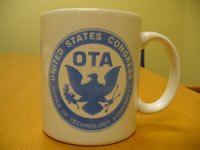Hidden among the many, many documents related to OTA we’ve received are some real treasures. Today we have photos of some old OTA coffee mugs. Does anyone else have old OTA memorabilia that we could photograph and add to the site? Yours truly is featured in the final shot.
The Office of Technology Assessment, like any successful organization, used regular self-evaluation to ensure that Congress got the most out of OTA reports. In response to suggestions from members of Congress and Hill staff, OTA created report briefs. These two to four page documents summarized the main points of a full report in simple, direct language. Today’s document is one of those report briefs, “The tragic loss of life from ‘friendly fire’ can be reduced”. It beings as follows:
The disturbing incidents of ‘friendly fire’ deaths suffered by the United States and its allies in the Persian Gulf War focused new attention on an old problem. U.S. forces shooting at their own units caused 24 percent of U.S. combat deaths in the war. The fraction of losses due to friendly fire, or fratricide, seemed extraordinarily high and caused considerable public concern and international friction. The OTA report, Who Goes There: Friend or Foe?, explores the causes of friendly fire and some of the remedies that might be found in new technology, training, and doctrine.
Click here to read the full 1993 OTA report, “Who goes there: friend or foe?”
More report briefs will be posted on this page in the coming days.
When we launched the OTA archive a few weeks ago we promised that new material not previously available to the public would be added to the archive. Today we’re happy to announce that some of this material is now available. Click here to read a copy of the press advisory that accompanied the release of this 1992 OTA report, “Genetic Tests and Health Insurance: Results of a Survey.”
The press release says:
The ongoing project to map human genes will almost certainly expand the number of DNA-based tests for genetic disorders by an order of magnitude over the next decade. How health insurers view such tests will affect their use, says the Congressional Office of Technology Assessment (OTA).
An OTA background paper issued today describes the results from a 1991 OTA survey of U.S. health insurers’ attitudes toward genetic tests and genetic information – both their attitudes towards genetic information in making determinations of insurability and how they might reimburse consumers for genetic tests.
This press advisory is one of eight newly available documents released in the summer and fall of 1992. Click here to check them out. We’d be happy to collect and scan similar documents if anyone has them.
By Marilyn Geewax | The Atlanta Journal-Constitution | August 17, 2008
This business article appeared over the weekend and features the economic ideas of Rob Atkinson, president of the Information Technology and Innovation Foundation. Mr. Atkinson worked for OTA in the early 1990s.
By Paul B. Farrell | marketwatch.com | August 18, 2008
Mr. Farrell discusses the impact of war on the American economy. Near the end of his article he says that people should read John Alic’s “Trillions for Military Technology: How the Pentagon Innovates and Why It Costs So Much.” Mr. Alic worked at OTA for over 15 years.
By Karen Carnabucci | Lake House Racine Blog | August 18, 2008
This blog post discusses the benefits and drawbacks of paying for psychotherapy with employer-issued health insurance versus out of pocket funds. Ms. Carnabucci cites this 1991 OTA report, “Medical Monitoring and Screening in the Workplace: Results of a Survey“, which found that “almost a third of the employers that maintained employee medical records let their personnel departments read those records without notifying the employee.”


